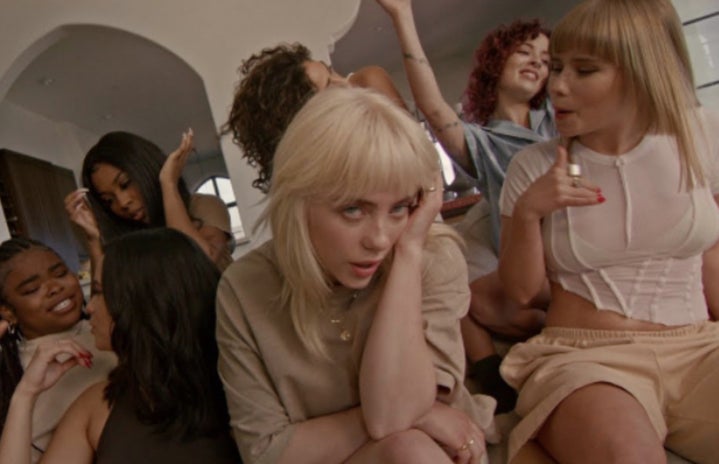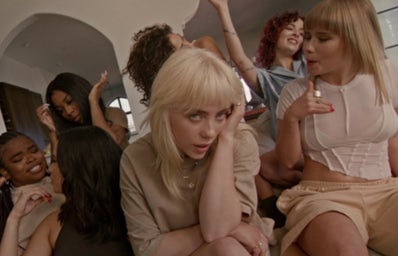In light of the recent release of Billie Eilish’s sophomore album, Happier Than Ever and the ensuing unnecessary backlash, I have to ask: are people ever pleased?
Let’s back up a bit. It was May of this year when Billie was featured on the cover of British Vogue and she received great scrutiny. Billie in a tight corset showing cleavage? To many, this was just unacceptable — but why? And unfortunately, she’s not the only woman in the music industry who’s had to deal with haters lately. From Olivia Rodrigo’s merch mayhem to Lizzo getting swarmed with hateful comments from online trolls for her new single “Rumors” featuring Cardi B, it seems like every time I open TikTok or Twitter lately, I see a female artist having to defend herself and her art. If it’s not the outfit, it’s the music. If it’s not the music, it’s the merch. In Billie’s case, it’s the image she portrays — one which might be shifting away from the one that made you reach your current level of fame (and your current fanbase). The difference between “Bad Guy” Billie and “Oxytocin” Billie is that she’s addressing what she had to sacrifice in the light of rapid fame and her experiences behind the scenes, when on the outside, it seemed like she was emerging as America’s newest pop sweetheart.
People grew to love Billie for her conservative wardrobe style and “f*ck you” mindset towards the music industry (and beyond) and the way that women are typically sexualized in it. If you remember, she would often be photographed in oversized clothes — massive hoodies, baggy sweatpants, and that legendary electric green striped hair. So, when a photo taken by some paparazzi of Billie in a tank top went viral, the point she was trying to make was proven tenfold. This transferred over to the soft sounds and pop-based beats you hear in her first album, WHEN WE ALL FALL ASLEEP, WHERE DO WE GO?. Her debut album has songs that still get stuck in my head, and they have the ability to have any teen scream, “YES, BILLIE UNDERSTANDS ME!” as they sing along. The tinge of gore and graphic lyrical imagery is what set the tone for Billie’s early career and people loved it. This is where I think a lot of Happier Than Ever’s backlash stems from.
The tinge of gore and graphic lyrical imagery is what set the tone for Billie’s early career and people loved it. This is where I think a lot of Happier Than Ever’s backlash stems from.
If you haven’t given Billie’s new album a listen, I highly suggest you do so. The soft, skillfully controlled, and wispy Billie voice everyone knows is coupled with extremely intimate lyrics that give listeners an authentic look at what it was like for her to reach ultimate stardom so quickly, and at such a young age. Happier Than Ever is the first album to kick off Spotify’s Artist Hub and Enhanced Experiences — Fan Mode, Lyric Mode, and Billie Mode. Each of these listening experiences offers different commentary and context around the album, truly allowing listeners to get inside Billie’s head and learn why this album is the way it is. If you’re asking yourself, “Okay, so why would anyone have any issues with an album so unfiltered and forthright?” I’m right there with you.
From the first track on the album “my future,” to the song “Your Power,” listeners can hear a common theme that Billie reiterates again and again: the pitfalls of fame and what she had to sacrifice now that she is in the limelight. Her life completely changed form, and that can take a toll on any person who goes through a similar situation. “my future” was the first track she wrote for the album (and the one she claims set the tone for the rest of the album in a string of Instagram stories earlier this month) and begins with Billie reflecting on her past and hardships she went through. It quickly shifts tone to being more optimistic as she grows as an artist and as a person — a person who no longer feels the need to hide behind bulky outfits to hide her body. This was the first single she released for Happier Than Ever and was not only a personal song for Billie, but also was relatable to the average listener as it was released in the heat of the COVID-19 pandemic — a time when everyone needed a breath of hope.
“Your Power” is another extremely vulnerable song, accompanied by an equally vulnerable music video, about Billie’s experience with abuse, something that has taken her a long time to reflect on and ultimately accept. This track’s music video has even been nominated for two awards at the 2021 MTV VMAs: Best Direction and Video for Good. This helps fans understand why she may have been so adamant to hide behind the initial Billie facade. That image wasn’t just a big “FU” to the music industry and sexualization of women (although that was a large part of it); it could have also been revealing the effects of someone who survived abuse.
“Your Power” helps fans understand why she may have been so adamant to hide behind the initial Billie facade.
So, I will ask again, what is there to hate about Happier Than Ever? Is it that Billie puts it all out on the table for her fans and displays her body differently than she has in the past? Let’s never forget the backlash she received when she was featured on the cover of British Vogue in a corset (c’mon, people!). This doesn’t mean she doesn’t still stand for everything she has stood by since the beginning of her career.
Let’s take a second and zoom out from the magnifying glass that Billie is under. Music fans love to hate on female artists for playing around with their image and subject matter; there seems to be a preference for female artists like Billie to stay in their original “boxes.” We’ve seen this time and time again. Taylor Swift critics in 2017 faced a similar identity crisis: Her “Look What You Made Me Do” video sent everyone into a frenzy about “Old Taylor” versus “New Taylor” (scream it from the rooftop with me now: “I’m sorry, but the old Taylor can’t come to the phone right now… Why? Oh, ’cause she’s dead!”). Why did it have to be a battle between New and Old — couldn’t it just be “Taylor”?
A more recent example is the harsh reviews Lorde is receiving in light of her newest album’s release, Solar Power. Consider this bit from Pitchfork’s review of Solar Power: “These songs don’t move like the songs on Melodrama: no startling change-ups, no fireworks, just a spoken interlude by Robyn and a few distracting foley effects.” Why can’t we let female artists evolve?
Music fans love to hate on female artists for playing around with their image and subject matter. We’ve seen this time and time again.
When Billie made her debut into the music scene in 2019, she was just 18 years old. Imagine if you never changed from your 18-year old self. Ideally, you grow into the person you’ve always wanted to be. You’re unapologetically yourself. You’re able to reflect on your past and recognize its effects then and now. Even your fashion sense! What I’m trying to say is, people change. Billie is entering this phase of self-growth and living life by her own rules. Time Magazine sums it up well by saying, “While some may clamor for the old Billie, the look fits the album’s more refined sonic approach—and will likely be only one of many stylistic shifts by a young star in the process of building a durable and unpredictable career.”
Billie, like nearly all other celebrities, has her fair share of scandals and controversies — there’s no denying that. In the song “Getting Older,” she addresses her ability to admit when she’s wrong. This can be considered a sign of someone maturing (if they actually own up to it and sincerely apologize, of course). So, if you truly are not a Billie Eilish fan, it’s completely understandable. But if you are a fan of “the old Billie” and have qualms with Happier Than Ever like the ones I’ve described, I’d just like to talk.


